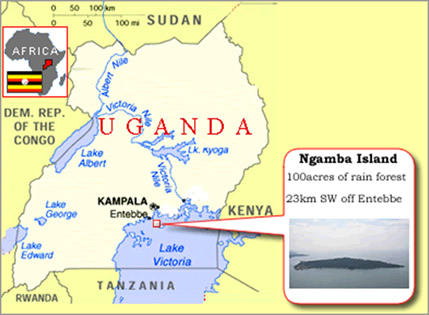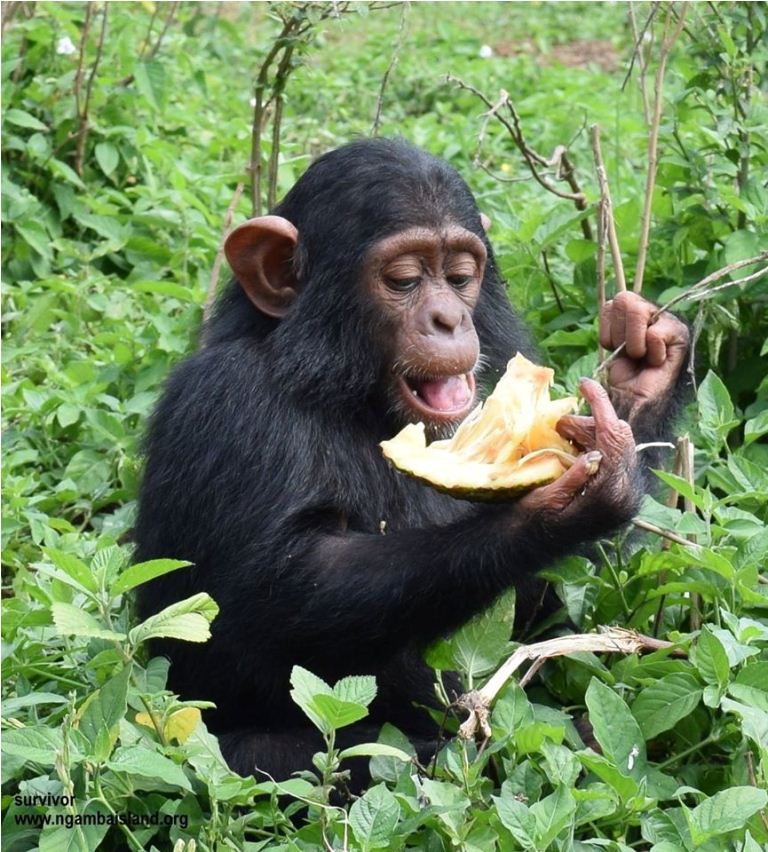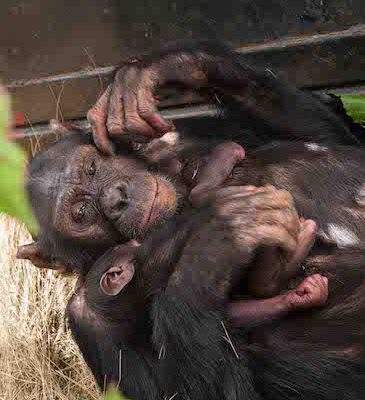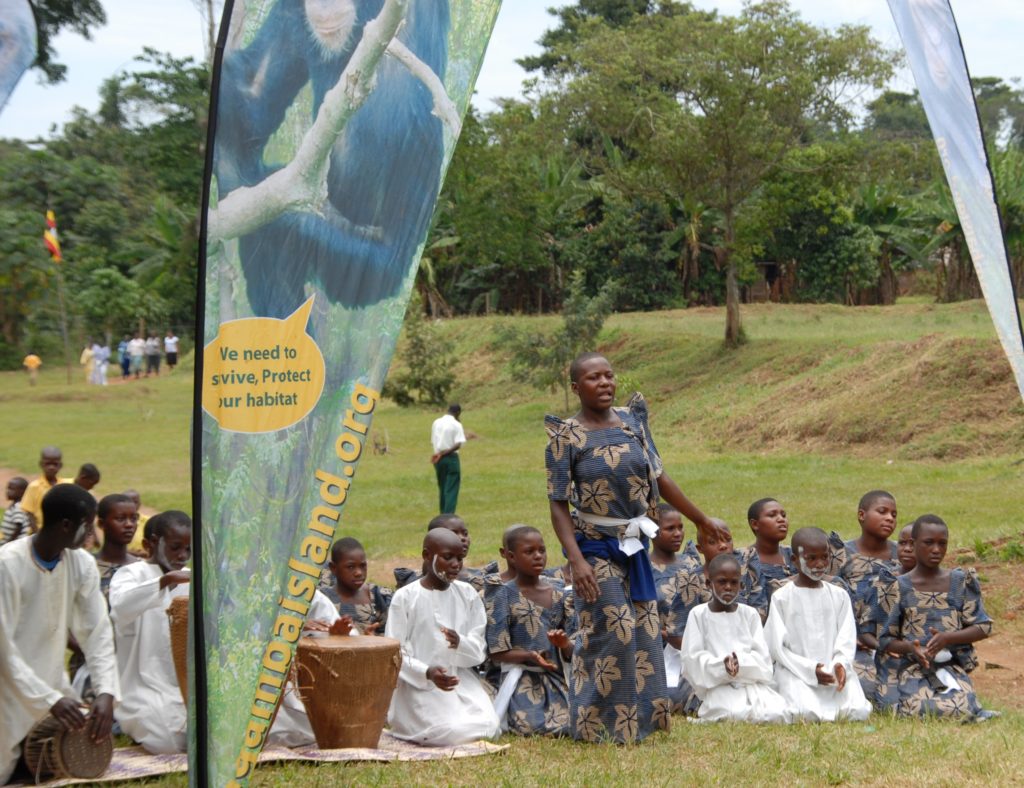Chimpanzee Sanctuary and Wildlife Conservation Trust in Uganda and Monkeyfriendly, Inc. are partnering together to create more community-based conservation projects.
Stay tuned to this space for our updates!
Founded in 1998, The Chimpanzee Trust has become a leading organization in the areas of 1) chimpanzee-focused environmental conservation, 2) excellence in the care & welfare of rescued chimpanzees, 3) increased public awareness of broader conservation issues with the chimpanzee as a key flagship species, and 4) engagement with communities living alongside chimpanzee populations.

Welcome to Ngamba!
Ngamba Island is part of the Koome group of islands located in Lake Victoria (which also includes Kiimi, Nsazi, Koome, Bulago and Damba Islands). Ngamba Island is approximately 23 km south-east of Entebbe, which lies on the mainland at 0.06’S, 32.39’E. It consists of approximately 100 acres, of which 95 acres is forested and separated from the human camp by an electric fence. The northern part of the island is generally flat, rising gently to an altitude of approximately 3800 feet above sea level to the south. The island is largely forested with gaps of grassland covering approximately 10% of the island.
VISIT US
Speedboat travel from the dock in Entebbe to Ngamba Island is approximately 45-50 minutes; travel by traditional motorized canoe takes approximately 90 minutes and by air it’s approximately 20 minutes from Entebbe Airport or Kajjansi Air strip.Independent operations also offer visits to the island. You can arrange your own transport, but make sure that you check availability with Ngamba Island Reservations Office to avoid disappointment. We strongly recommend that you book your lake journey directly with Ngamba Island Reservations Office or travel with a reputable company to ensure your safety.

VOLUNTEER
Make a difference in the lives of the 50 chimpanzees by becoming one of the vital chimp champs today for man’s closest relative through taking care of their welfare through; preparing their food and environmental enrichment, feeding them , cleaning their sleeping facility, behavior observation & monitoring, record keeping and community work. All activities are on a complimentary basis; Thrill of knowing that your contribution is directly supporting the overall conservation of species and supporting the local communities. "Only a life lived in the service to others is worth living."-Albert Einstein

NATURAL DIET
A study in Budongo Forest, Uganda found that 64.5% of their chimp feeding time concentrated on fruits (84.6% of which being ripe), particularly those from two species of Ficus, Maesopsis eminii and Celtis durandii. In addition, 19% of feeding time was spent on arboreal leaves, mostly Broussonetia papyrifera and Celtis mildbraedii. While the chimpanzee is mostly herbivorous, it does eat honey, soil, insects, birds and their eggs, and small to medium-sized mammals, including other primates.
Source: Wikipedia
CHIMP FACTS
The chimpanzee (Pan troglodytes), also known as the common chimpanzee, robust chimpanzee, or simply chimp, is a species of great ape native to the forest and savannah of tropical Africa. It has four confirmed subspecies and a fifth proposed subspecies. The chimpanzee and the closely related bonobo (sometimes called the "pygmy chimpanzee") are classified in the genus Pan. Evidence from fossils and DNA sequencing shows that Pan is a sister taxon to the human lineage and is humans' closest living relative.
Source: Wikipedia

SEMI-WILD LIFE
Ngamba Island is currently home to 49 orphaned and confiscated chimps, rescued from the illegal pet and bushmeat trade. Despite their initial trauma, chimps living at Ngamba have a safe and semi-natural environment in which to recover and eventually thrive over their long lives of up to 60 years.Founded in 1998, the island offers 95 acres of natural forest where the chimps roam and forage daily. Their diet is supplemented multiple times per day much to the delight of visiting tourists who are able to observe the feeding from a viewing platform. The chimps also have the freedom to stay in the forest at night or return to nighttime enclosures where they can build nests and receive an evening meal.
VISIT OUR CHIMPS
Discover first-hand what it takes to care for 49 chimpanzees living in a sanctuary setting where they have 95 acres of forest to roam every day. See how much food they eat, meet the team who care for them and watch chimpanzee social behavior up close from a viewing platform that overlooks the forest.You will also learn about chimpanzee conservation efforts in the wild and the greatest threats facing their extinction such as habitat encroachment, poaching and the illegal pet trade.

SURPRISE BABY
On 17th February 2016, a baby girl chimpanzee was born at Ngamba Island chimpanzee sanctuary by Kyewunyo(Surprise) one of the female chimpanzees’ at the island. The mother of the baby girl chimpanzee was also born at the island 1st July 2002. In this case we are allowed to say like mother like daughter because Surprise just like her mother Katie, gave birth to a bouncing baby girl chimpanzee.. Surprise is a sub adult female Chimpanzee who conceived while on contraceptives (implant failure).

MUSIC DANCE DRAMA
Despite little success to pass on its conservation messages through music dance and drama at National level, the Chimpanzee Trust works closely with Wildlife Clubs of Uganda (WCU) to organize music dance and drama competitions during key conservation events.The Chimpanzee Trust also organizes an annual event to create awareness on conservation education among schools on Koome Islands, 13 primary schools are actively involved in this program. Music Dance and Drama contributes to talent development and it improves the learning experience of children hence reducing pupils’ dropout rate among the island community schools.


